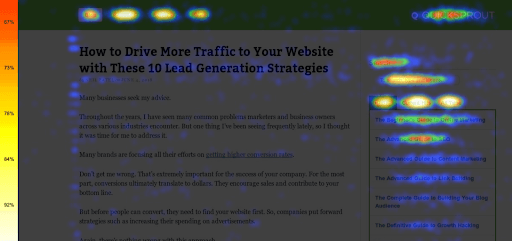Marketing
5
min read
4 reasons why Digital Marketers can’t ignore User Experience


Don't you want to read? Try listening to the article in audio mode 🎧
Can you recall the last time you had a very bad experience on a website? Perhaps the navigation was confusing, the page loaded slowly, you couldn’t find the information you were looking for or the checkout experience was clunky. If you can, that experience has stuck with you and left a lasting impression on you about that company or brand. If you can’t remember it happening recently, it is for that exact reason. Companies nowadays understand the importance of providing a good user experience and are therefore willing to invest time and money in improving it. If they don’t, they will lose customers and market share to competitors who do provide a good website experience.
 Example heatmap from Crazy Egg[/caption] With eCommerce continued growth, the companies that can provide a stellar online shopping experience will tap into a huge revenue stream and so will the digital marketers that can help them get there.
Example heatmap from Crazy Egg[/caption] With eCommerce continued growth, the companies that can provide a stellar online shopping experience will tap into a huge revenue stream and so will the digital marketers that can help them get there.
User Experience (UX) and Digital Marketing
On its broadest level, user experience is how a person feels when interacting with any type of product or system. User experience is not something you can create. It is something that happens regardless of your interaction but you can shape and nurture it. Your digital marketing strategy likely comprises a number of different activities, each playing a role in moving your potential customer towards a goal. From awareness at the very top of the funnel, there will be multiple touchpoints before they visit your website and make that final conversion. They might search Youtube to see how your product works, look for reviews to see what other people have said, check your website for delivery information, etc.The ease with which the consumer can find and access this information can often be the difference between a sale or not.Digital marketing is an extremely competitive space. There are thousands of businesses competing for your attention every day. However, they all have one thing in common: the quality of an individual's online experience makes a huge impact. Understanding your customer journey and providing a good experience at each stage is the difference between converting interest into revenue or not. For businesses competing in the online space, UX is not only crucial to their success but in many cases, survival. Now that we have established its importance, let's take a look at 4 reasons why Digital Marketers cannot ignore website user experience.
1. User experience will be key for SEO in 2022
Organic traffic is a valuable source of website traffic for most businesses. Organic visitors typically have high intent and are more likely to purchase or take action on your website. There are many different factors that Google looks at to determine your website’s search engine ranking but recently, Google has placed more emphasis on ‘page experience’. Page experience is determined by page loading times, interactivity, mobile responsiveness, providing a safe and secure HTTPS connection, essentially all the elements that affect your visit to a webpage. Websites that perform well in all of these areas will be rewarded with higher positions on SERPs and with more organic traffic. The page experience ranking signal went into effect for mobile devices in August 2021 and the rollout will be complete by the end of March 2022. You can learn more about the page experience rollout and optimising your page experience here. When we think about SEO, it's easy to fall into the trap of thinking about it as the relationship between your website and Google. In reality, it’s about the relationship with your audience. Yes, you need to make your website search engine friendly but your focus should always be on your customer. If you provide valuable content that your audience finds useful or interesting, they will spend longer on your website, browse more pages, and even share it with others. Customer-centric companies have always benefitted from organic traffic and will even more so when the page experience rollout is complete. So for marketers working on SEO activities in 2022, providing a good user experience will be a key part of their strategy.2. Time is money
Customers nowadays are impatient. The recommended page load speed is under 4 seconds. Any longer than that and your potential customers have left your site and are now browsing your competitor's website. Furthermore, according to Econsultancy, '88% of online consumers are less likely to return to a site after a bad experience’. So once you frustrate a user, they will remember that and may never come back again. You may have crafted the most engaging and eye-catching campaign of the year but if your website is slow, you will lose a huge amount of potential customers. Along with the customer journey, time is an important element for digital marketers to consider. Use the Page Speed Insights tool to check your landing pages before you launch your campaign.3. COVID-19 has changed shopping forever
Ecommerce was growing fast before COVID-19 hit. But the pandemic pushed even more consumers online, accelerating eCommerce by 3 years in some estimates. Ongoing lockdowns and stay-at-home orders forced more people to embrace the convenience of eCommerce, a shift that is likely to remain. Companies already in the eCommerce game reaped the rewards while those who weren’t scrambled to get products online. With growth on both the customer and retailer sides, there is great demand and opportunity for digital marketing skills. However, with so much competition in this space and high customer expectations, just bringing users to the online store won’t cut it. Webshops must meet consumer expectations, offering seamless integration from browsing to purchase and a frictionless checkout. Digital marketers in this space need to look beyond high-level analytics metrics and understand what is really happening on the website. Bounce rates and average session duration do not paint the full picture. Tools such as Hotjar and Crazy Egg allow you to use heatmaps, click reports, and even screen recordings to identify potential pain points and drop-offs. They offer a deeper look into user behaviour on your website and allow you to set up experiments to optimise for conversions. Even a 1% increase in conversion rate can have a tremendous impact on revenue. [caption id="attachment_12681464" align="alignnone" width="300"] Example heatmap from Crazy Egg[/caption] With eCommerce continued growth, the companies that can provide a stellar online shopping experience will tap into a huge revenue stream and so will the digital marketers that can help them get there.
Example heatmap from Crazy Egg[/caption] With eCommerce continued growth, the companies that can provide a stellar online shopping experience will tap into a huge revenue stream and so will the digital marketers that can help them get there.
4. UX helps you create clearer marketing messages
The basis of UX design starts with understanding the user. Before attempting to design a product or service, the team spends time researching the user, understanding their behaviours, motivations, pain points, goals, and aspirations. Only with a clear understanding of the user can you begin to define the problem that is to be solved and the product or service that will satisfy that need. As marketers, our job is to explain how our product or service can solve the customer's needs. However, without the same understanding, how can we create the right message? How do we know what information they need to make a decision? By integrating a UX approach, digital marketers can improve targeting, create an attractive offer and articulate it in a way that is clear, concise, and persuasive.To wrap up...
Digital marketers nowadays are challenged with understanding the entire customer journey and not just the ad campaign. Advertising tools such as Facebook Ads Manager and Google Ads are so user-friendly now that anyone could set up a campaign and start targeting their audience. Setting yourself apart in digital marketing will depend on your true understanding of the customer, their motivations, behaviours, and how you can appeal to them. UX design is all about understanding the customer and putting them at the centre of what you do. So much of what you can take from user experience lends itself to marketing, making it a powerful combination of skills. If you would like to upskill and add UX Design to your CV make sure to check out our UX Design Courses.
Article updated on: 17 August 2023

Don't Waste Your Talent. Turn It Into a Career With a Course That Fits Your Needs!
Talent Garden is your Digital Skills Academy, offering courses in Digital Marketing, UX Design, Digital HR and Data Analysis designed to launch your career.
Keep reading

6
min read
8 Essential Elements of Great UX Design
User experience (UX) design is integral to creating an appealing product or service for users. It’s used in a wide ...
Talent Garden
21/04/2023

9
min read
Product Metrics: What they are, and how to use them?
If the large world of User Research for a digital product could be summed up in a paragraph, two extremes of the ...
Talent Garden
16/06/2022

7
min read
9 Successful Tips For Enhancing Your Developer-Designer Collaboration
Any major project will have a team of professionals working closely with one another. One example of close ...
Talent Garden
22/12/2023

7
min read
10 Ways to Utilize User Experience Analytics to Improve Website Engagement
What does the term user experience analytics mean? Why is it a useful tool? And how can you utilize it to improve ...
Talent Garden
31/01/2023
